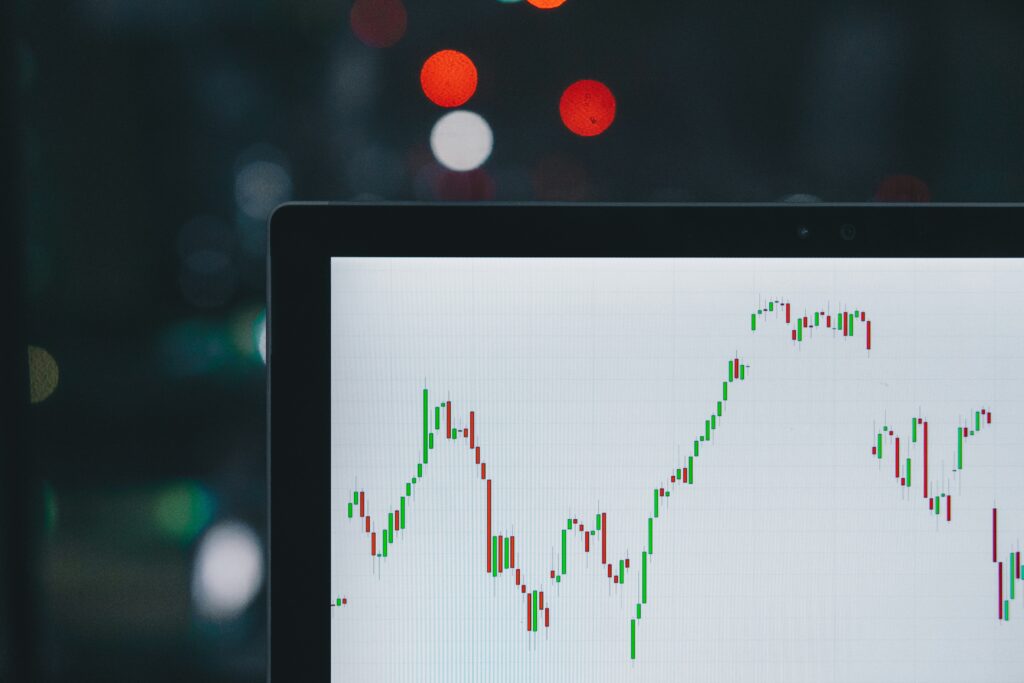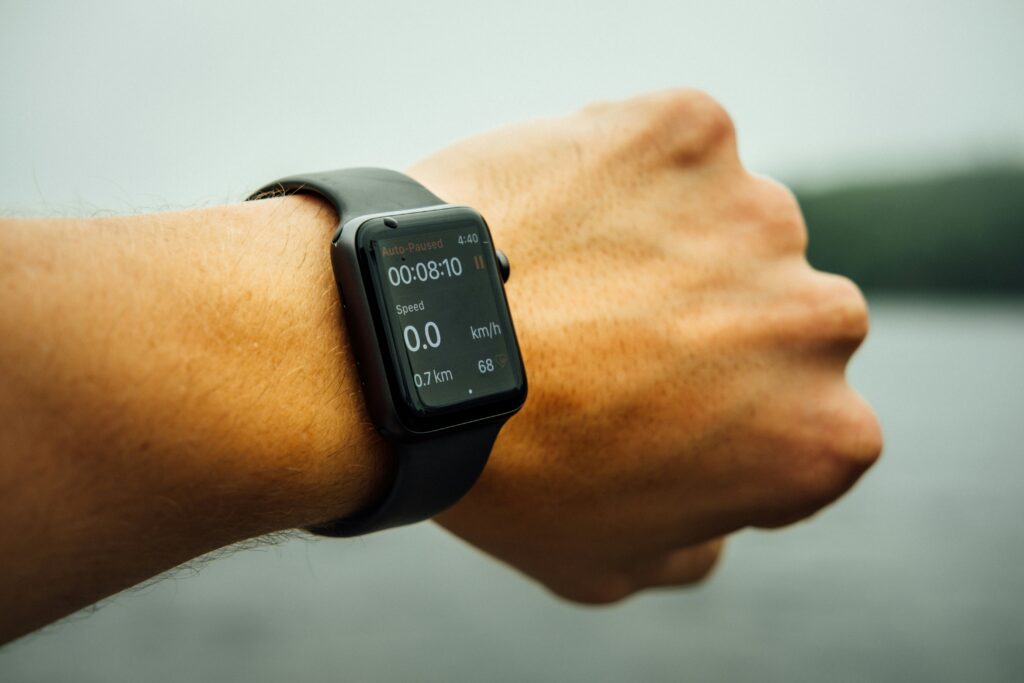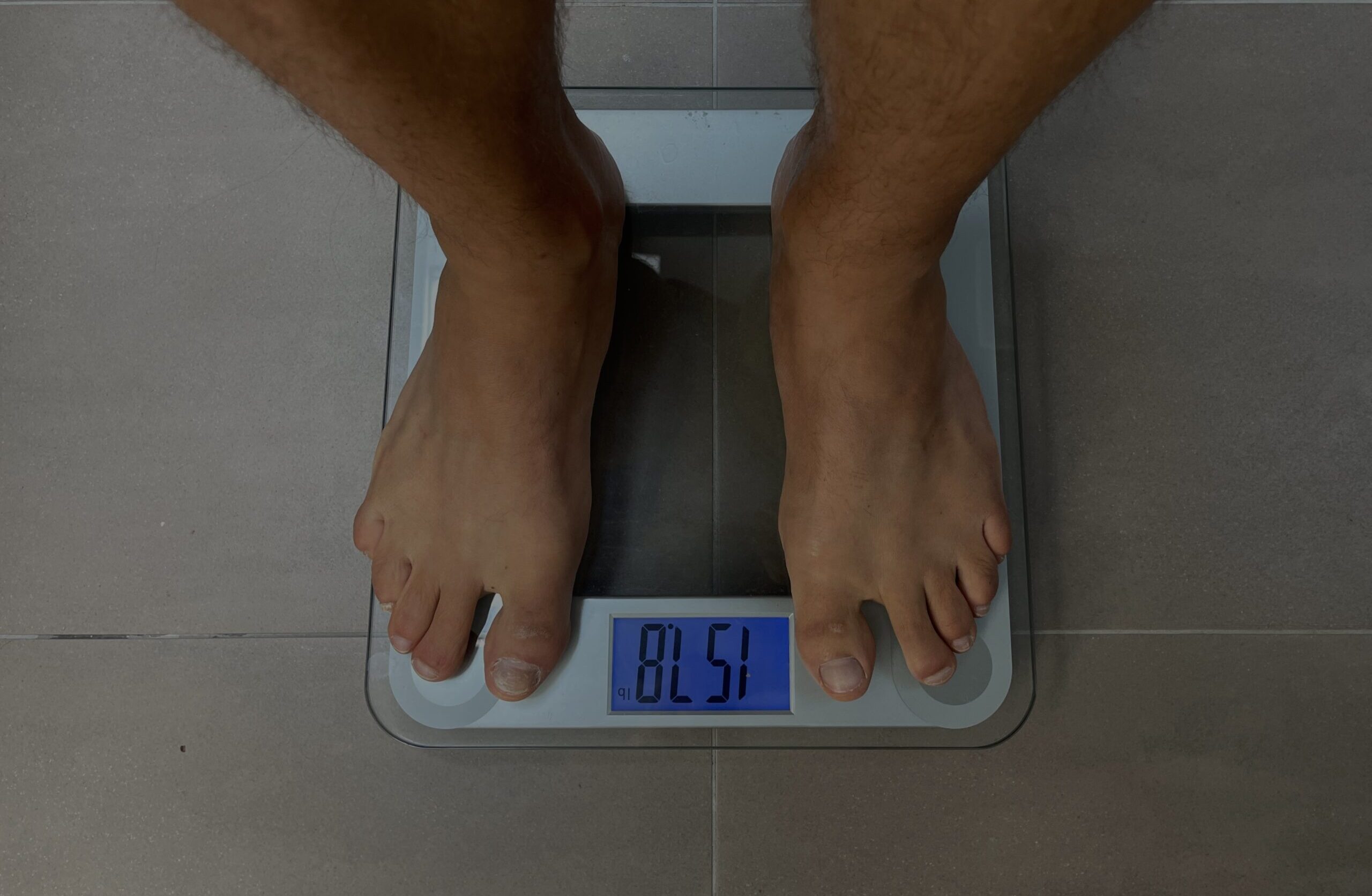It’s a familiar scenario: You step onto the scale in the morning, and the number you see can set the tone for your entire day.
If the scale goes down, you feel motivated and might even indulge a bit, thinking you’ve earned it. (I’ve even seen some men react to losing weight as another failure, as if they aren’t doing enough—the pressure to be “man enough” never subsides.)
If the number on the scale is higher than expected, you might feel disheartened and either restrict your food intake or throw in the towel and overeat.
Letting the scale dictate your day is problematic because it relies on a lagging indicator—your body weight—to influence present-moment decisions.
This raises the obvious question: Should you even bother weighing yourself?
For most guys, the answer is “Yes!” Here is the definitive guide for how you should track your body weight.
The Common Pitfall: Letting the Scale Dictate Your Day
Imagine navigating a winding road, but instead of focusing on the path ahead, you keep looking at the road behind you. To make it worse, what you see is not the road immediately behind you. It is the road you crossed hours or even days ago.
Letting the scale influence your daily food choices is like driving a car by only looking in the rearview mirror. You are constantly reacting to things in the past, with little understanding of how these relate to what your body needs right now.
You might try to swerve left because, at some point, hours ago, you swerved right. Every decision you make is based on where you have been, not where you are going.

Letting the scale influence your daily decisions can cause reactive, erratic adjustments—skipping meals, over-exercising, cutting out certain foods—that might unwittingly throw you off course and contribute to the problems you want to solve.
A Better Approach: Intuitive Eating + Holistic Gameplan
If the scale is a poor guide for daily eating decisions, what is a better approach?
A combination of Intuitive Eating and a Holistic Gameplan.
Intuitive eating is about gathering information about what your body needs right now. It is the skill of slowing down and paying close attention to cues like hunger and fullness. It asks you to sense your desire to eat and try to parse apart whether you’re actually hungry or just thirsty, lonely, angry, or tired.
>> Download Your Free Eating Skill Checklist <<
Paying attention to your body, in the moment, as you are eating, is the most essential skill to regulate your eating.
The challenge is, like any skill, it takes practice.
You must learn how to recognize what your body is telling. You must also how to interpret these signals. A lot of things can masquerade as hunger—anxiety, boredom, fatigue, procrastination.
If you live a “go go go” lifestyle with lots of stress, your hunger and fullness cues may have become dysregulated.
There’s a reason drugs like Ozempic are flying off the shelves. They’re a way of manufacturing fullness in a world of dysregulated hunger.
A Holistic Gameplan
A holistic game plan means you have considered your eating from multiple angles. You are not flying through your day, directionless and eating whatever crosses your path. A game plan gives you an idea—not necessarily written in stone—of what and when you will eat, what metrics to track, and what values will guide your eating.
>> Grab Your Free “9 Weight Loss Mistakes” Ebook <<
Having a game plan means that you’ve done the necessary legwork to cook, order, or organize your meals. It does not mean you need to count calories or feel bound by a rigid structure. It means you have general guiding principles for your eating habits.

There is no one-sized-fits all game plan. But there are best practices that stand the test of time.
Having worked with dozens of men, I often suggest some of the following practices to make part of your eating game plan:
- Eating slowly and chewing thoroughly.
- Not eating while multitasking.
- Pausing halfway through the meal and sensing your level of fullness.
- Adding additional vegetables to your meal whenever possible.
- Shifting your late-night snacks to earlier in the day.
- Avoiding calorically dense foods multiple meals in a row.
- And so on…
A holistic game plan supports intuitive eating and vice versa. These two components are like skillfully sailing a boat.
Your game plan charts the course, and your intuition controls the sail and rudder. One without the other doesn’t work very well. Both allow you to stay on course, adjusting your eating for whatever food life throws your way.
Where Does the Scale Fit into This?
The point of tracking your body weight is to safeguard against drifting too far out of balance. Imagine the indicator light on your car that only turns on when swerve out of your lane. If you drive straight and stay in your lane, the light stays off. There’s no reason to worry about it. You’re on course.
The scale is like this indicator light. Day-to-day ups and downs on the scale are natural curves and adjustments on the road. They shouldn’t turn on the indicator light. So long as you’re paying attention, keep driving to your destination and don’t worry about little changes!

Only when things start to move beyond your guardrails—for example, a certain number of pounds above or below your baseline weight—you should start to pay attention. It might be time for corrective action.
In this way, the scale is like a warning signal. It gives you an opportunity to intervene to prevent things from spiraling out of balance. It give you a chance to change your eating and lifestyle before things become extreme.
Why Weigh Yourself Every Day?
This is the hardest part to wrap your heads around: You daily weight measurements should have zero effect on today’s eating behavior. That means you do not make decisions on emotional reactions to the scale. You follow your game plan.
So why weigh yourself every day if the number doesn’t matter?
The number does matter, but only as a single data point in larger a trendline. Respond to trends in your weight—that indicator light on the car going off—don’t react to daily fluctuations.
Weighing yourself irregularly will not give you quality data. Your weight can fluctuate for many reasons, including water retention, bowel movements, muscle shifts, or even the time of day.
If you only weight yourself occasionally, it is hard to know if that data is noise or an accurate signal of real weight change. Moreover, weighing yourself regularly helps you become desensitized to daily fluctuations. They’re signs that you’re alive, not succeeding or failing.
Changes in your body weight are signs you’re alive. Don’t react to daily fluctuations. Respond to long-term trends.
How should I go about weighing myself?
Pick a consistent time to weigh yourself, preferably in the morning after using the bathroom and before eating or drinking anything. This will help create some level of consistency.
Once you have enough data, say a few weeks, you can start to draw a trendline. Get curious about dips and jumps, but don’t obsess about it or get lost in the minutia. Pay attention to significant deviations from your norm that might indicate something out of balance.

Remember, fluctuations and oscillations around your baseline are expected and normal. Your weight might change seasonally, and if you have a few years of data, you can see how these long-term patterns play out.
What if the scale really messes with my head?
I talk about some of the ways to overcome scale anxiety and deal with the emotional component of weighing yourself in this article: 6 Ways You Can Overcome Scale Anxiety.
I suggest getting a smart scale that automatically saves and graphs your weight in an app. You can get on the scale and face backward, so you don’t even have to see the number. Let the app record the data for you.
Decide when you will analyze your weight data. This may be every other week, once a month or once a quarter. Don’t approach from a “good/bad” mindset. See it as a chance to learn.
What if my weight crosses the threshold—that indicator light turns on!—and I feel like I’m on the wrong path?
If your average weight moves beyond your guardrails, it’s an opportunity to revisit your game plan and intuitive eating skills. Remember, these two pieces form the bedrock of your day-to-day eating, not what the scale said today.
If your weight has drifted out of balance, it is time to assess the situation. You need to look for hidden variables and root causes of weight changes that might be unaddressed. Mindless snacking? Sleep disturbances? Hormonal changes? Shifts in your activity levels? Sophisticated self-deception?
Consider how your weight change correlates with:
- How you feel?
- How your clothes fit?
- Your appetite and energy?
- Changes in your health markers (e.g. bloodwork, cardiac capacity, etc.)?
- How well you can move your body?
- How comfortable and confident you feel in your own skin?
The way forward is to make adjustments and run experiments. You need to align and update your goals, metrics, and behaviors.
Once you’ve changed your game plan, stick with. Don’t jump around. You need to adjust one thing long enough to get good data and see what changes.

A holistic game plan is all about gaining physical and mental health. You must include objective, quantifiable metrics (e.g., body composition, bloodwork, aerobic capacity) and subjective qualitative measures (e.g., feelings, emotions, intuitions). Anything less will not be holistic enough to create sustainable change.
Why This Approach Works
Using the scale as a data-gathering tool rather than a daily decision-maker helps you maintain a steady course. Here’s why this method is effective:
- Reduces Emotional Reactions: Not letting daily fluctuations affect your mood or behavior reduces the emotional rollercoaster that can come with weight management. Consider tracking your body weight every day a form of exposure therapy. If you do it with compassion, unattached to the daily number, it gets easier with time.
- Provides Long-term Trendlines: A single day’s weight can be misleading, but trends over several weeks give you a clearer picture of your progress. This data can help you make informed adjustments to your plan if needed, but it doesn’t lead to reactionary, often impulsive decisions that can have negative long-term consequences.
- Encourages Consistency: Weighing yourself becomes a habit and an opportunity for self-care. Like making your bed and brushing your teeth, doing what you say you are going to do helps build your “follow-through” muscles.
- Builds Trust in Your Body: The longer you track your weight and the more you take care of yourself the best you know how, it helps you trust that your body can self-regulate and balance when you provide it the right conditions to do so. Seeing that your weight will go up and down but overall remain in balance builds trust in your body and increases the likelihood of creating a healthy relationship with food and achieving sustainable results.
- Builds Resilience: When you have data that indicates significant weight changes, you can implement actions such as adjusting your eating to create a balancing feedback loop. This ultimately enhances your long-term resilience and stability.
The Scale Helps You Stay Accountable To Your Best Self
When used correctly, the bathroom scale is valuable for preventing weight drifts that are indicative of something out of balance. It can help you cultivate a deep, unbiased awareness of how your lifestyle impacts your body. But it cannot help you understand why your weight is changing if you don’t want it to.

This is why coaching is necessary to determine how your lifestyle is impacting your body.
I can help you understand what is holding you back from making progress. We analyze your life from every possible angle to discover the mental, physical, and emotional blocks holding you in place.
First, we get rid of barriers to your growth and progress. Then, we build your intuitive eating skills and develop a holistic game plan that is flexible, adaptive, and tailored to your body, lifestyle, and preferences—not another rigid, all-or-nothing diet.
If you want to turn your scale into an ally rather than an enemy, set up a time to chat.
~ Jeff
Learn More About Personalized Health & Nutrition Coaching for High-Achieving Men


